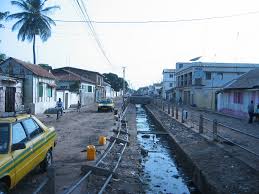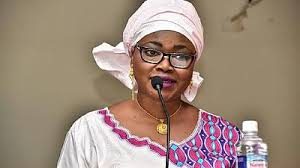By Amadou Dibba, Birmingham, UK
My memories of the Greater Banjul Area (GBA) and the Kombos in general, distinguished collectively as arguably the most attractive for people seeking to move from rural to urban settlements in The Gambia, are dominated by the image of a hotchpotch of urban, semi-urban and peri-urban swathes of human settlements broadly similar in two important characteristics.

The first of this is the lack of any significantly coordinated town planning strategy necessary to making adequate provision for networks of motorable roads and well mapped layouts of habitation amenable to assigning and locating individual home addresses and street names. A corollary of this state of affairs is that the resultant settlements, barring few notable pockets of housing estates that sprang up in the last two decades or so, are in many cases criss-crossed by labyrinths and alleys that more often than not snake through adjacent or contiguous homes, making it almost impossible to assign easily locatable home addresses. It makes one wonder as to when, how or if satellite navigation could ever be utilised, at least for civilian purposes, in our corner of the world even if our government or governments are able to muster the resources to deploy a satellite(s) in space someday. Or is the use of such a technology redundant in The Gambia because everybody knows everywhere else in the country? I think not.
The second characteristic shared by these different settlements is the absence of a proper drainage or sewage system able to prevent waste water, or even sewage, collecting and settling on the surface right among and in the midst of homes and streets. This is especially acute in Banjul where even the gutters meant to create conduit for waste water used to be in many cases neglected and blocked with litter. For all I know this may no longer be the case but I will be the least surprised if this situation still obtains. The seriousness of Banjul’s case is presumably due to, or compounded by, her insular geography, coupled with the fact that space is at a premium. I am no expert but I believe these will most definitely impact the capacity of the soil to provide seepage for the amount of sewage produced, particularly taking the density of the population into account. In this respect I bear in mind that Banjul is home to many offices and businesses whose staff, although mainly live elsewhere in the GBA, spend a lot or most of the working days in Banjul and therefore, dare I say, inevitably contribute their fair share of waste of any and all kind. But this could be resolved by the establishment of communal sewage systems or facilitating the installation of such systems for individual homes whereby a certain standard of sewage treatment and disposal will be ensured. Judging by Banjul’s perennial problem with sewage management, I believe I can safely say this is not the case, or that at least it could be better.
Of course I know it will be expecting unreasonably too much or going on a flight of fancy to expect a poor country like The Gambia to have established and maintained decades ago a certain standard in terms of town planning. However I believe it is high time that the government in concert with local authorities started thinking seriously about planning our towns and city(ies) in such a way that the almost certain increase in population is catered for. Failing this, I dread to contemplate how messy, congested and unhealthy our towns are going to get in future.

Thus Rohey Malick Lowe’s (RML’s) rant against my kin and kind or kith and kin (Badibunkas) is completely gratuitous. She could just as easily have argued the case for Banjul, being the capital, without antagonizing any section of the population. There are possibly a multiplicity of ways to make a case for better infrastructural development and sanitation for Banjul without descending to the level RML has if she truly has a good grasp of the issues retarding the progress and welfare of Banjul, a capital city which, in some people’s view, is fast turning out to be an apology of a capital. This leads me therefore to ask the question as to what it is about some of our public officials that they now and again tend to embarrass themselves by dropping clangers or making ridiculous pronouncements, such as disparaging a section of their electorate by means of some thoughtless remark while making public speeches. It suffices to state that few politicians will wittingly do this, if out of purely selfish reasons – thinking about the next election round the corner. The answer, I will suggest, boils down to the fact that such public figures tend to have the most tenuous of grasps of the issues affecting their constituencies and, as such, find themselves overwhelmed by the prospect of addressing public gatherings without a well thought out and considered subject to speak about. This clearly appears to be the problem for RML in her recent plea for government’s intervention in the plight of the capital.
Interestingly the reaction to RML’s statement has been swift and widespread. Those condemning the statement (with varying levels of fury ranging from mild to passionate), including myself, are mostly people from Baddibu or related to Baddibunkas who, to my mind, have rightly taken offence at a public official betraying her lack of understanding of the issue she was publicly making a speech about. Those defending RML on the other hand have tended to portray those condemning her as either over-sensitive or too prone to over-react, arguing in the main that the remark was only jocular and not meant to be taken seriously; that Baddibunkas should learn to be good sport and entertain the amusement of others at their own expense. My personal experience, for what it is worth, is that a lot of those taking this stance are Kiankas (people from a different region in The Gambia who share a joking relationship, called Sanawyaa in vernacular, with Baddibunkas) who seem to be gloating at the fact that Baddibunkas have been at the butt end of an unflattering remark. I tell some of them that the only reason they are not at the target of this statement by RML is that most of them fleeing from Kiang tend to exhaust their savings when they reach Brikama and simply pitch their tents there, relieved they have finally landed in Kombo.
On a more serious note, Banjul’s descent to the present doldrums she sadly finds herself in is by no means a rapid one. It has been a long time in coming. I do not even want to refer to the steady but constant stream of mostly long-term but disillusioned residents relocating to elsewhere in the Kombos to illustrate this point. I refer to a New African magazine article in the early 1990s entitled “A Stranger in Banjul” in which the author, Baffour Ankomah, among other things outlined his impressions of our capital. I still dimly recall how the city’s infrastructure, sanitation and transport situation apparently struck him as unprepossessing at best. From then on it has been a gradual descent into dreariness and decrepitude as evidenced by the poor state of repair of the roads, poor sanitation and the obvious psychological impact of the general malaise on what remains of the population.
However be this as it may, the responsibility of rehabilitating or gentrifying Banjul is surely not solely the government’s, as the now infamous cry of RML seems to suggest. The city authority itself must play a substantial role in any revivification endeavour. After all it is supposed to be in charge of the day-to-day management of the city’s affairs. That the situation has degenerated to such a level in the first place, it could be argued, is to a large part the failure of successive city authorities. To suggest otherwise is to say that the Banjul City Council (BCC) is not viable, in the sense that it cannot fund at least a major part of the city’s projects.
In a nutshell, there is a public policy imperative for the government of The Gambia and various local authorities to ensure future-conscious planning of our various towns and city in order to minimise congestion, sewage and general waste management problems and other related issues. As such the present condition of Banjul is much more complicated than the supposed misbehaviour of Baddibunkas, joke or not.
